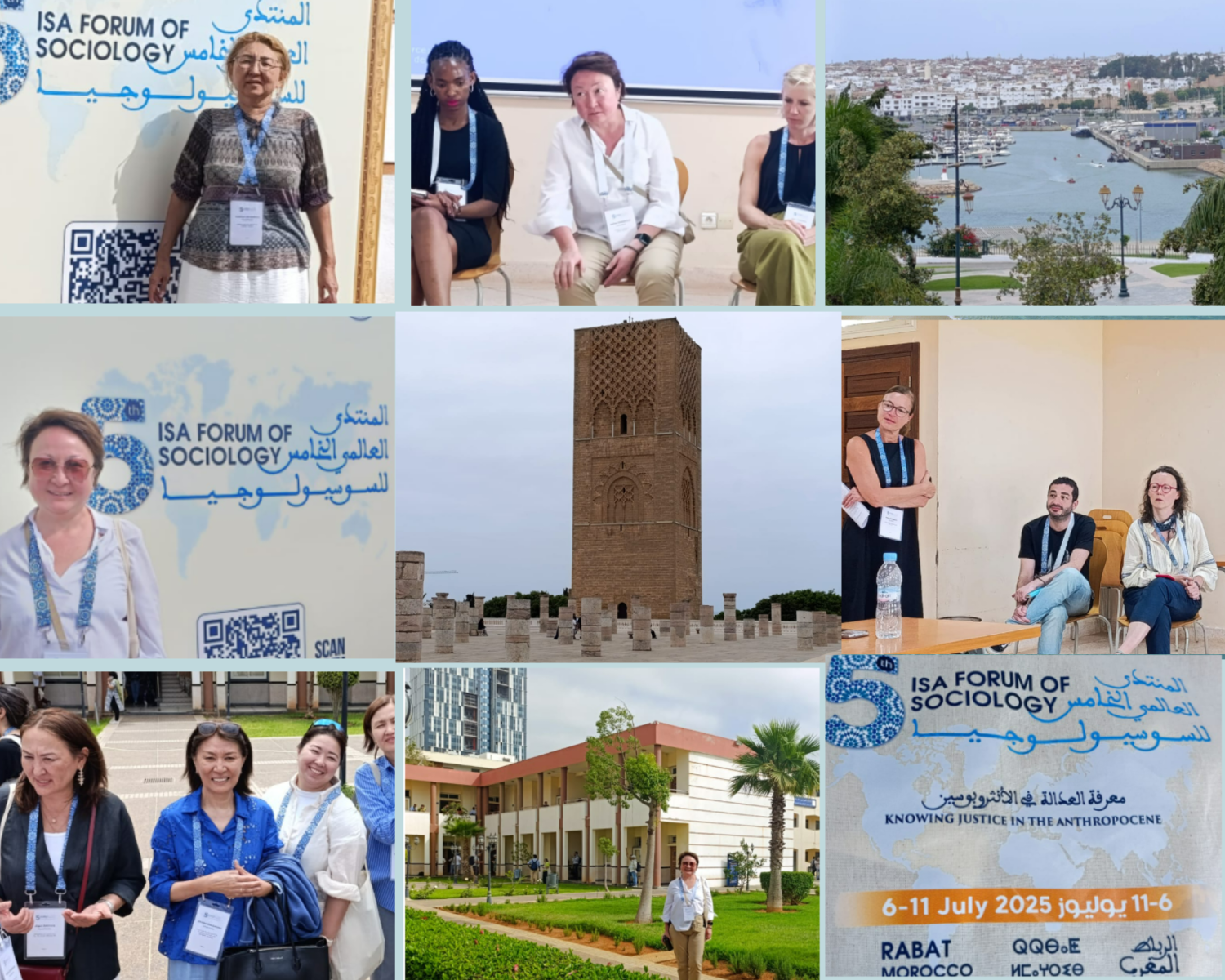Kazakhstan Sociologists on the Global Sociological Stage: Key Themes from the ISA Forum in Morocco
Kazakhstan Sociologists on the Global Sociological Stage: Key Themes from the ISA Forum in Morocco
From July 6 to 11, 2025, the 5th ISA Forum of Sociology was held in Rabat, Morocco, gathering over 4,200 scholars from more than 100 countries. For the first time, this major academic event took place in the MENA region and on the African continent an important symbol of the growing global representation of the Global South. The forum's central theme, "Knowing Justice in the Anthropocene", called on the sociological community not only to reflect on social inequalities but also to reassess fundamental concepts of social justice in the context of ecological and technological transformations.
A particularly noteworthy contribution came from Aizhan Shabdenova (Deputy Director of CIOM) and Gulzhan Alimbekova (Director of CIOM), who presented a study titled "Single Parenting in Kazakhstan". Based on a qualitative methodology, their research explored the socio-economic adaptation and everyday survival strategies of single parents in the context of urbanization and the decline of traditional family support systems in Kazakhstan. Their analysis highlighted informal safety nets such as extended family, social networks, and the influence of religious norms especially the phenomenon of unofficial marriages conducted according to Sharia. The presentation illustrated how sociology can uncover hidden mechanisms of social vulnerability that are often invisible to state statistics and excluded from official support programs.
The theme of family transformation was echoed in other Kazakh contributions. In the session "Civil Society in the Conditions of Political Transformation in Kazakhstan", Dr. Sergey Konovalov offered a critical reflection on the state of civil society during a transitional political period, examining institutional constraints and opportunities for horizontal mobilization. A study by Arsen Avsatkarinov and Aslanbek Amrin (El Umiti Foundation) on household spending on education revealed a growing educational inequality and its ties to disparities in access to quality resources and school infrastructure. In contrast, Aliya Sarsekeyeva, Sulushash Kaztaeva, and their colleagues presented insights from Kazakhstan’s academic Olympiads, showcasing successful cases of overcoming barriers and unlocking the potential of students in rural schools.
The Kazakh delegation also addressed the reconfiguration of sociocultural values and identities. In their work "Social Imprints of Political and Cultural Values: The Case of Kazakhstan", Aigul Zabirova, Saltanat Ermakhanova, and Natalya Seitakhmetova demonstrated how deeply embedded historical ideas continue to shape modern political behavior and public sentiment. In the session "How Kazakh Youth Sees the Future?", a team led by Serik Seydumanov and Zarema Shaukenova presented a comprehensive exploration of the hopes, fears, and reference points of Kazakhstani youth raising essential questions about the future of a generation shaped by post-Soviet transformation, the digital age, and geopolitical uncertainty.
The presentations by Kazakh sociologists were not only rich in empirical content but also analytically mature. They went beyond local contexts to address fundamental sociological questions: How are institutional forms of family and state evolving? What types of inequality are being reproduced through education? What is the role of culture, identity, and representation in an era of global instability? Participation in such an international forum underscored both the professional caliber of Kazakh sociology and its growing intellectual contribution to global academic discourse.
Importantly, the ISA Forum served as a platform not only for presenting results but also for shaping the sociological community of the future one rooted in interdisciplinarity, social engagement, and scientific responsibility. At a time when the challenges of the Anthropocene have taken on not just ecological but also moral dimensions, the voice of Kazakhstani sociology proved timely and necessary.
Kazakhstan’s sociological community is increasingly making its mark on the global stage not through slogans, but through thoughtful analysis, rigorous research, and bold questions.
As the Kazakh proverb says: "Bílimdíge dúnie jarıq, bílímsízge tún qap-qara" - The world is bright for the knowledgeable; for the ignorant, it is utter darkness.
For the first time, Kazakhstan was represented by 25 participants from diverse academic institutions an unprecedented presence at the ISA Forum. This participation is not just an act of academic integration, but also a meaningful contribution to enlightenment an effort to understand both ourselves and the world through the lens of sociology. It means not following the world, but walking alongside it with our own voice and our own meaning.

Комментарии
| Имя * | |
| Комментарий * | |
